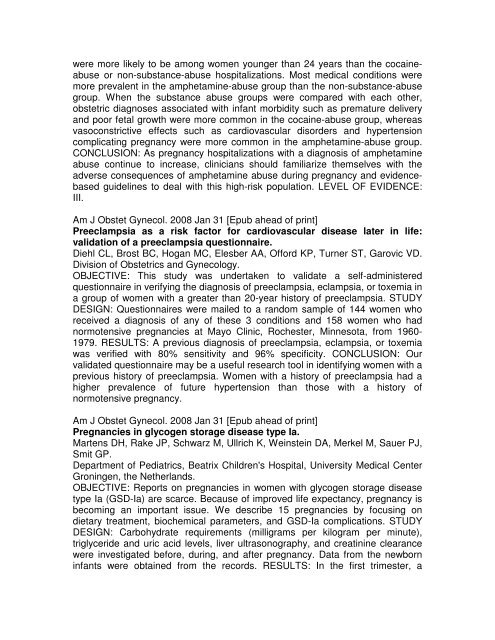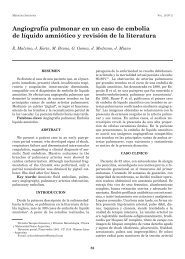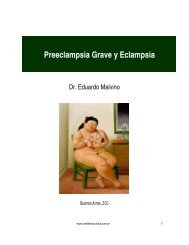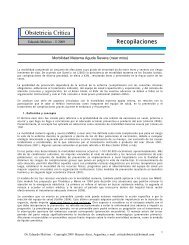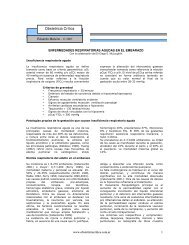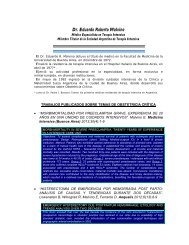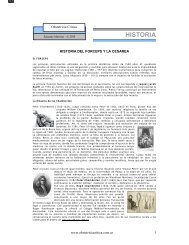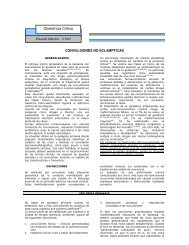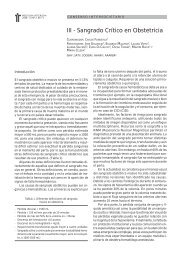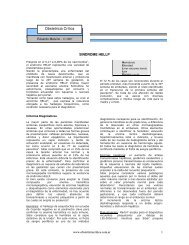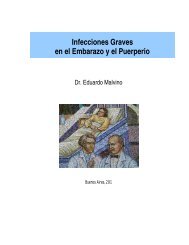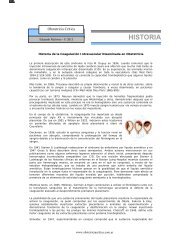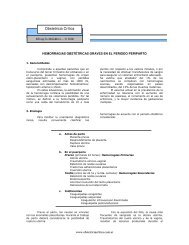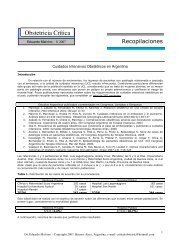were more likely to be among women younger than 24 years than the cocaineabuseor non-substance-abuse hospitalizations. Most medical conditions weremore prevalent in the amphetamine-abuse group than the non-substance-abusegroup. When the substance abuse groups were compared with each other,obstetric diagnoses associated with infant morbidity such as premature deliveryand poor fetal growth were more common in the cocaine-abuse group, whereasvasoconstrictive effects such as cardiovascular disorders and hypertensioncomplicating pregnancy were more common in the amphetamine-abuse group.CONCLUSION: As pregnancy hospitalizations with a diagnosis of amphetamineabuse continue to increase, clinicians should familiarize themselves with theadverse consequences of amphetamine abuse during pregnancy and evidencebasedguidelines to deal with this high-risk population. LEVEL OF EVIDENCE:III.Am J Obstet Gynecol. <strong>2008</strong> Jan 31 [Epub ahead of print]Preeclampsia as a risk factor for cardiovascular disease later in life:validation of a preeclampsia questionnaire.Diehl CL, Brost BC, Hogan MC, Elesber AA, Offord KP, Turner ST, Garovic VD.Division of Obstetrics and Gynecology.OBJECTIVE: This study was undertaken to validate a self-administeredquestionnaire in verifying the diagnosis of preeclampsia, eclampsia, or toxemia ina group of women with a greater than 20-year history of preeclampsia. STUDYDESIGN: Questionnaires were mailed to a random sample of 144 women whoreceived a diagnosis of any of these 3 conditions and 158 women who hadnormotensive pregnancies at Mayo Clinic, Rochester, Minnesota, from 1960-1979. RESULTS: A previous diagnosis of preeclampsia, eclampsia, or toxemiawas verified with 80% sensitivity and 96% specificity. CONCLUSION: Ourvalidated questionnaire may be a useful research tool in identifying women with aprevious history of preeclampsia. Women with a history of preeclampsia had ahigher prevalence of future hypertension than those with a history ofnormotensive pregnancy.Am J Obstet Gynecol. <strong>2008</strong> Jan 31 [Epub ahead of print]Pregnancies in glycogen storage disease type Ia.Martens DH, Rake JP, Schwarz M, Ullrich K, Weinstein DA, Merkel M, Sauer PJ,Smit GP.Department of Pediatrics, Beatrix Children's Hospital, University Medical CenterGroningen, the Netherlands.OBJECTIVE: Reports on pregnancies in women with glycogen storage diseasetype Ia (GSD-Ia) are scarce. Because of improved life expectancy, pregnancy isbecoming an important issue. We describe 15 pregnancies by focusing ondietary treatment, biochemical parameters, and GSD-Ia complications. STUDYDESIGN: Carbohydrate requirements (milligrams per kilogram per minute),triglyceride and uric acid levels, liver ultrasonography, and creatinine clearancewere investigated before, during, and after pregnancy. Data from the newborninfants were obtained from the records. RESULTS: In the first trimester, a
significant increase in carbohydrate requirements was observed (P = .007). Mostpatients had acceptable triglyceride and uric acid levels during pregnancy. Noincrease in size or number of adenomas was seen. In 3 of 4 patients, a decreasein glomerular filtration rate was observed after pregnancy. In 3 pregnancies,lactic acidosis developed during delivery with severe multiorgan failure in 1. Allbut 1 of the children are healthy and show good psychomotor development.CONCLUSION: Successful pregnancies are possible in patients with GSD-Ia,although specific GSD-Ia-related risks are present.BMJ. <strong>2008</strong> Feb 2;336(7638):239.Obstetric care must change if Netherlands is to regain reputation for safechildbirth.Sheldon T. Utrecht.Int J Gynaecol Obstet. 2007 Nov;99(2):142-3. Epub 2007 Jul 27.Recurrence following conservative management of placenta accreta.Kayem G, Clément D, Goffinet F.Department of Obstetrics and Gynecology, Centre Hospitalier Intercommunal deCréteil, University Paris XII, Créteil, France. gkayem@gmail.comInt J Gynaecol Obstet. 2007 Nov;99(2):105-9. Epub 2007 Jul 2.Intraumbilical injection of uterotonics for retained placenta.Habek D, Franicević D.Department of Obstetrics and Gynecology, School of Medicine, Sveti DuhGeneral Hospital, Zagreb, Croatia. dubravko.habek@os.t-com.hrOBJECTIVE: To assess the effect of injecting an uterotonic agent in the umbilicalvein during the third stage of labor in women with retained placentas.METHODS: In this prospective clinical study, 75 women with retained placentasreceived 20 mL of a 0.9% saline solution with either 20 IU of oxytocin (n=54), 0.5mg of carboprost tromethamine (n=7), or 0.2 mg of methylergometrine (n=14)injected in the umbilical vein after clamping. The treatment success wasdetermined by the clinical signs of placental ablation. RESULTS: There were nostatistically significant differences among the 3 therapeutic groups regarding age,parity, risk factors, pregnancy duration, type of delivery (spontaneous, induced,or augmented), or possible early postpartum complications caused by theintraumbilical injection. The rates of therapeutic success were 76.9% in theoxytocin group, 85.7% in the synthetic prostaglandin group, and 64.2% in themethylergometrine group. CONCLUSION: The intraumbilical injection ofuterotonics is a noninvasive, effective, and clinically safe method of shorteningthe third stage of labor in women with retained placentas.J Reprod Med. <strong>2008</strong> Jan;53(1):52-4.Acute colonic pseudoobstruction complicating twin pregnancy: a casereport.Tung CS, Zighelboim I, Gardner MO.
- Page 1 and 2: Obstetricia CríticaEduardo Malvino
- Page 3 and 4: gestational age at delivery, Apgar
- Page 5 and 6: Maternal risk factors associated wi
- Page 7 and 8: exclusive categories: 1) bleeding r
- Page 9 and 10: Division of Obstetrics and Gynecolo
- Page 11 and 12: as uncommon as primary synovial sar
- Page 13: Cardiac Troponin I Elevation After
- Page 17 and 18: of one per 1500 pregnant women. Cal
- Page 19 and 20: Background: To investigate the rela
- Page 21 and 22: PowerLab hardware unit and Chart v3
- Page 23 and 24: Prophylactic antibiotics for the pr
- Page 25 and 26: years old (n = 23,921). Univariate
- Page 27 and 28: five women uses FDA C, D and X drug
- Page 29 and 30: and complicated. CONCLUSION: Irresp
- Page 31 and 32: clinically effective. Nevertheless,
- Page 33 and 34: Obstetrics and Gynecology Departmen
- Page 35 and 36: Pregnancy-induced severe gestationa
- Page 37 and 38: penicillin or ampicillin, whereas 3
- Page 39 and 40: Abetalipoproteinemia complicating t
- Page 41 and 42: case of acute abdominal pain, abdom
- Page 43 and 44: Callaway LK, Lawlor DA, McIntyre HD
- Page 45 and 46: ketoacidosis during induction of la
- Page 47 and 48: and low platelets (HELLP) syndrome.
- Page 49 and 50: Division of Reproduction and Endocr
- Page 51 and 52: simulation center, and to teamwork
- Page 53 and 54: significantly associated with psori
- Page 55 and 56: episiotomy and prophylactic oxytoci
- Page 57 and 58: ecent obesity epidemic has had a pr
- Page 59 and 60: guidelines in 2002. However, the di
- Page 61 and 62: need for intensive neonatal care, h
- Page 63 and 64: mEq/l) metabolic acidosis. Other et
- Page 65 and 66:
Acta Obstet Gynecol Scand. 2008;87(
- Page 67 and 68:
etrospective review of pregnancies
- Page 69 and 70:
Maternal obesity and pregnancy comp
- Page 71 and 72:
interval 3.78-5.30) and severe obst
- Page 73 and 74:
of GDM. Methods: 1,662 pregnant wom
- Page 75 and 76:
Registers. POPULATION: All pregnant
- Page 77 and 78:
J Reprod Med. 2008 May;53(5):365-8.
- Page 79 and 80:
egarding cervical cancer screening
- Page 81 and 82:
College of Surgeons in Ireland, Dub
- Page 83 and 84:
maternal morbidity has increased bo
- Page 85 and 86:
increased uterine activity was rela
- Page 87 and 88:
options.Journal of Perinatology adv
- Page 89 and 90:
atio, 1.73; 95% CI, 1.11-2.69). Thi
- Page 91 and 92:
discharge at site of perineal repai
- Page 93 and 94:
Thirty-one other patients refused t
- Page 95 and 96:
Department of Obstetrics and Centre
- Page 97 and 98:
developed any new problems. CONCLUS
- Page 99 and 100:
It seems to be safe to continue bre
- Page 101 and 102:
colonization in a subsequent pregna
- Page 103 and 104:
Crude and adjusted odds ratios were
- Page 105 and 106:
the subsequent development of ESRD.
- Page 107 and 108:
Acta Obstet Gynecol Scand. 2008 Sep
- Page 109 and 110:
OBJECTIVE: To investigate pregnancy
- Page 111 and 112:
OBJECTIVE: To compare the perinatal
- Page 113 and 114:
exceptionally rare. CASE: A 23-year
- Page 115 and 116:
CONCLUSION: This case demonstrates
- Page 117 and 118:
peripartum hysterectomy included ce
- Page 119 and 120:
BMJ. 2008 Sep 8;337:a1397. doi: 10.
- Page 121 and 122:
Lancet. 2008 Sep 17. [Epub ahead of
- Page 123 and 124:
Obstet Gynecol. 2008 Oct;112(4):951
- Page 125 and 126:
Additionally, the effects of distur
- Page 127 and 128:
analyzed. Initial echocardiographic
- Page 129 and 130:
pathologic or anatomically anomalou
- Page 131 and 132:
Eur J Obstet Gynecol Reprod Biol. 2
- Page 133 and 134:
chorioamnionitis; and (3) in contra
- Page 135 and 136:
underlying conditions related to st
- Page 137 and 138:
third trimester of pregnancy.BMJ. 2
- Page 139 and 140:
Texas Health Science Center, Housto
- Page 141 and 142:
preterm birth before 34 weeks (P
- Page 143 and 144:
cases. Most patients (91%) received
- Page 145 and 146:
Ultrasound Obstet Gynecol. 2008 Nov
- Page 147 and 148:
Maggard MA, Yermilov I, Li Z, Magli
- Page 149 and 150:
Clinical and Population Health, Per
- Page 151:
the biologic mechanism is unclear,


